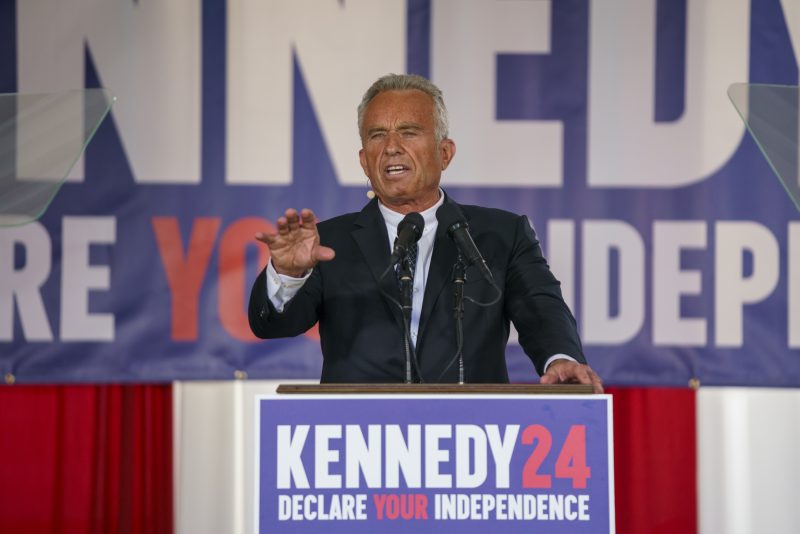
OAN’s Elizabeth Volberding
3:52 PM – Monday, February 19, 2024
2024 Independent presidential candidate Robert F. Kennedy Jr. released a video online and launched a petition calling for Julian Assange, a whistleblower and the founder of WikiLeaks, to be freed immediately and granted a pardon.
On Tuesday, Judges in London will determine whether Assange has used up all of his appeals in British courts and they will also decide whether or not to extradite him to the United States, where he could possibly be imprisoned for the rest of his life.
Julian Assange, a newspaper publisher, was sentenced to 13 years in prison for purportedly disclosing governmental atrocities and crimes to the public. The WikiLeaks’ founder is currently detained and may be extradited to the United States.
Assange has repeatedly exposed corruption within the U.S., from the torture at Guantanamo Bay, to the DNC’s anti-democratic acts, to civilian deaths in the War On Terror.
RFK Jr. made a statement on Kennedy24.com regarding the call to release Assange.
“Attacking the messenger is never good policy,” RFK Jr. said. “The government’s war against whistleblowers has turned heroes into criminals. Only if we stand together can we protect free speech, which is why I am encouraging every American to sign our petition to demand the immediate pardon and release of Julian Assange from incarceration.”
Additionally, according to RFK Jr.’s website, the Independent candidate has vowed that if he is elected in 2024, “my [RFK Jr.’s] first day in office, I will pardon Julian Assange and investigate the corruption and crimes he exposed.”
RFK Jr. has also stated that he “will issue an executive order to end all attempts by federal agents and federal agencies to censor the political speech of Americans.”
The Justice Department has been urged to drop criminal charges against Assange by the New York Times, four prominent European news organizations, and numerous other media outlets.
They have cautioned that this sort of protocol could eventually pave the way for later criminalizing other journalists who expose government secrets and possible wrongdoing to the public, even though they are just doing their jobs.
Editors and publishers of the five media outlets that demanded for Assange’s release are The Guardian, Le Monde, El País, Der Spiegel and The New York Times. These media organizations initially worked with WikiLeaks to release shocking articles in 2010 that were based on private diplomatic cables from the State Department.
Assange had been detained by both Sweden and the United Kingdom since his arrest in London, England, in December 2010, according to the United Nations Working Group on Arbitrary Detention.
In 2012, Assange took refuge in Ecuador’s London embassy after losing his appeal against his extradition to Sweden, where a court case was filed against him and he was placed under house arrest.
The 52-year-old Australian computer expert has been charged with 18 crimes in the United States in connection with the 2010 release of hundreds of thousands of classified documents by Wikileaks. He is charged with one count of computer misuse and 17 counts of espionage.
Assange’s attorneys have stated that he could serve a maximum sentence of 175 years in prison if found guilty. However, American authorities said that the true sentence will most likely be far less time.
Assange and his allies contend that he is entitled to protection under the First Amendment’s right of freedom of the press since he purportedly utilized his journalistic skills to uncover wrongdoing by the U.S. military.
Assange’s supporters have acknowledged him as a “heroic whistleblower” who defended democracy against an “increasing surveillance state.”
A lengthy legal battle in the United Kingdom concluded by charging him with five years in prison and seven years of self-exile inside a foreign embassy. Assange’s fight to avoid being charged with spying in the United States may now be coming to a close.
Starting on Tuesday, Assange will reappear in court in London in what may be his last attempt to prevent extradition to the United States. Two days of oral arguments regarding whether Assange should be sent across the Atlantic or whether he can ask an appeals court to block his transfer have been scheduled by the High Court.
Stay informed! Receive breaking news blasts directly to your inbox for free. Subscribe here. https://www.oann.com/alerts

